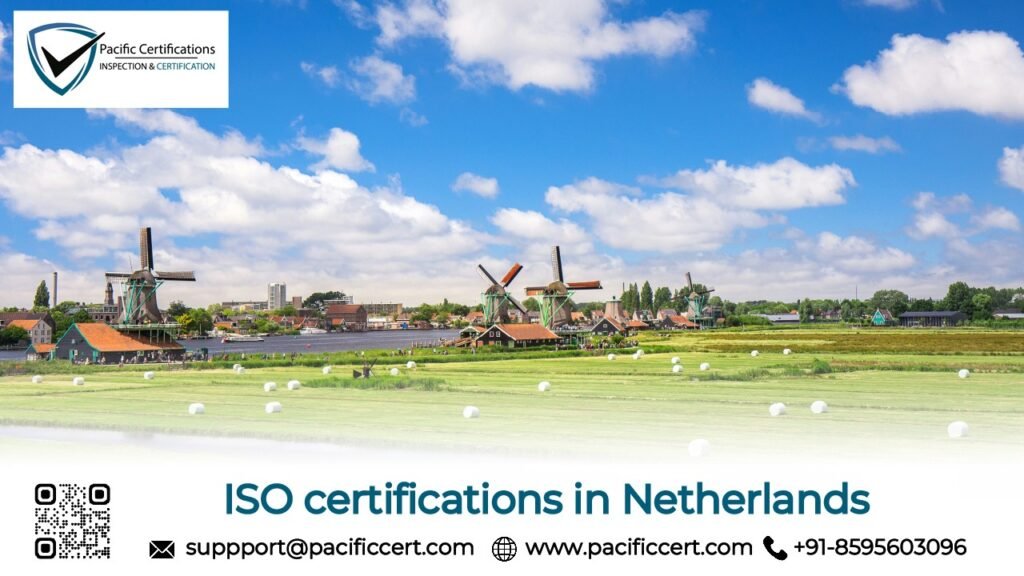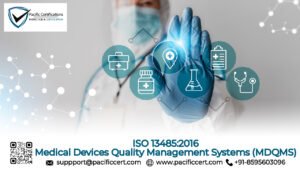
ISO Certifications in the Netherlands and How Pacific Certifications Can Help
In today’s global marketplace achieving ISO certification is one of the most effective ways to demonstrate this commitment. The Netherlands, known for its robust economy and emphasis on innovation, is no exception. Companies operating in the Netherlands understand the importance of adhering to international standards to stay competitive.
ISO certification, an internationally recognized mark of quality, opens doors to new markets, enhances customer trust, and ensures compliance with industry regulations. In this comprehensive guide, we will explore the popular ISO standards in the Netherlands, the requirements for obtaining them, and the benefits they offer to businesses of all sizes.
Popular ISO Standards in the Netherlands
The Netherlands is home to a diverse range of industries, from manufacturing and technology to finance and healthcare. As such, various ISO standards are particularly relevant to businesses operating in the country. Here are some of the most popular ISO standards:
ISO 9001: Quality Management System (QMS)
ISO 9001 is the most widely recognized quality management standard worldwide. It sets out criteria for a quality management system that can be applied to any organization, regardless of size or industry.
ISO 14001: Environmental Management System (EMS)
Environmental responsibility is a key concern for businesses in the Netherlands, a country known for its commitment to sustainability. ISO 14001 helps organizations manage their environmental impact by providing a framework for developing an effective environmental management system.
ISO 45001: Occupational Health and Safety Management System (OHSMS)
ISO 45001 focuses on creating a safe and healthy work environment. This standard is crucial for businesses in industries where workplace hazards are a concern, such as construction, manufacturing, and logistics.
ISO 27001: Information Security Management System (ISMS)
In an era where data breaches and cyber threats are on the rise, ISO 27001 is increasingly important. This standard provides a framework for managing sensitive company information and protecting it from security threats.
ISO 22000: Food Safety Management System (FSMS)
The Netherlands is a major player in the global food industry, making food safety a top priority. ISO 22000 outlines the requirements for a food safety management system, helping organizations in the food supply chain identify and control food safety hazards.
ISO 50001: Energy Management System (EnMS)
Energy efficiency is critical in the Netherlands, where energy costs are high, and environmental concerns are pressing. ISO 50001 helps organizations develop an energy management system to improve energy performance, reduce energy consumption, and lower costs.
Click here to find out more applicable standards to your industry
Requirements for ISO Standards
Achieving ISO certification requires a clear understanding of the specific requirements set out by each standard. While the requirements vary depending on the standard, there are common elements that businesses in the Netherlands must address during the certification process:
Understanding the Standard
Before beginning the certification process, it is essential to thoroughly understand the ISO standard relevant to your industry.
Gap Analysis
Conducting a gap analysis is a critical step in identifying areas where your current processes do not meet the requirements of the ISO standard.
Documentation
Proper documentation is a cornerstone of ISO certification. This includes developing policies, procedures, and records that demonstrate compliance with the standard.
Implementation
Once the necessary documentation is in place, the next step is to implement the processes and practices that align with the ISO standard. This involves training employees, updating workflows, and establishing monitoring mechanisms to ensure compliance.
Internal Audits
Internal audits involve a thorough review of your processes and documentation to ensure they meet the standard’s requirements. Internal audits help identify any areas of non-conformance that need to be addressed before the certification audit.
Management Review
Top management must review the performance of the implemented system to ensure its effectiveness. This review typically involves assessing the results of internal audits, customer feedback, and other performance indicators.
Certification Audit
The final step in the process is the certification audit conducted by an accredited certification body. This audit involves a comprehensive review of your management system to ensure it meets the requirements of the ISO standard. If successful, your organization will be awarded ISO certification.
Benefits of ISO Standards
ISO certification offers a wide range of benefits that can significantly impact your business. Here are some of the key advantages of obtaining ISO certification in the Netherlands:
- ISO certification is recognized globally as a mark of quality and excellence.
- ISO standards provide a framework for optimizing processes and improving operational efficiency.
- Adhering to ISO standards helps businesses in the Netherlands comply with national and international regulations.
- ISO standards are designed to help organizations identify and mitigate risks.
- ISO standards emphasize meeting customer requirements and continuously improving products and services.
- ISO certification is often a prerequisite for doing business in international markets.
- Implementing ISO standards involves engaging employees in the process of continuous improvement.
Who Needs ISO Certification?
ISO certification is relevant to a wide range of businesses and industries in the Netherlands. Whether you are a small startup or a large multinational corporation, ISO standards can benefit your organization. Here’s who typically needs ISO certification:
Manufacturing Companies
Manufacturers in the Netherlands must adhere to strict quality, safety, and environmental standards. ISO certification, particularly ISO 9001 and ISO 14001, helps manufacturers ensure product quality, minimize environmental impact, and comply with regulatory requirements.
Service Providers
Service-based businesses, such as IT firms, financial institutions, and consulting agencies, can benefit from ISO 9001 for quality management and ISO 27001 for information security.
Food and Beverage Industry
The Netherlands has a significant food and beverage industry that relies on ISO 22000 to ensure food safety. Businesses involved in food production, processing, and distribution need ISO certification to meet customer expectations and regulatory requirements.
Construction and Engineering Firms
Safety and environmental impact are major concerns in the construction and engineering sectors. ISO 45001 for occupational health and safety and ISO 14001 for environmental management are essential certifications for companies in these industries.
Healthcare Providers
Healthcare organizations in the Netherlands can benefit from ISO 9001 for quality management and ISO 27001 for information security. These standards help ensure patient safety, data protection, and compliance with healthcare regulations.
Government and Public Sector
ISO certification is increasingly being adopted by government agencies and public sector organizations in the Netherlands. ISO standards help these entities improve efficiency, transparency, and service delivery to the public.
How we can help
At Pacific Certifications, we understand the challenges that businesses face in achieving ISO certification. As a leading certification body, we specialize in auditing and certifying organizations against various ISO standards. Here’s how we can help:
Certification Audit
Our team of experienced auditors will conduct a thorough certification audit of your organization’s management system. We assess your compliance with the relevant ISO standard, identify any areas of non-conformance, and provide guidance on how to address them. Our goal is to ensure that your organization meets all the requirements necessary for certification.
Issue of Certification
Once your organization successfully passes the certification audit, we will issue the ISO certification. This certification serves as an official recognition of your compliance with international standards and can be used to enhance your reputation and credibility in the marketplace.
Surveillance Audits
ISO certification is not a one-time event; it requires ongoing compliance. We conduct regular surveillance audits to ensure that your organization continues to meet the requirements of the ISO standard. These audits help maintain the validity of your certification and support your commitment to continuous improvement.
Re-certification
ISO certificates are typically valid for three years, after which re-certification is required. Pacific Certifications will guide you through the re-certification process, ensuring that your management system remains compliant with the latest standards.
While we do not offer consultancy services, training, or implementation support, we work closely with you throughout the audit and certification process. Our focus is on providing a rigorous and impartial assessment that helps your business achieve and maintain ISO certification.
What is the Certification Process
Achieving ISO certification involves several key steps. At Pacific Certifications, we make the process as straightforward as possible. Here’s an overview of the certification process:
The process begins with an initial inquiry where you express interest in obtaining ISO certification. We will discuss your specific needs, the ISO standard you wish to pursue, and the scope of certification.
Application and Contract
Once you decide to move forward, you will complete an application form, and we will provide you with a contract outlining the terms of the certification process. This contract includes details about the audit process, fees, and timelines.
Pre-Audit (Optional)
Some organizations opt for a pre-audit to identify any potential issues before the formal certification audit. While this step is optional, it can be beneficial for organizations seeking to address any gaps in their management system.
Certification Audit
The certification audit is the most critical part of the process. Our auditors will visit your premises to assess your management system against the requirements of the ISO standard. This audit involves reviewing documentation, interviewing employees, and observing processes.
Non-Conformity Resolution
If any non-conformities are identified during the audit, you will be given an opportunity to address them. Once the non-conformities have been resolved, we will conduct a follow-up audit to verify compliance.
Certification Decision
After the successful completion of the certification audit and resolution of any non-conformities, our certification committee will review the audit findings. If all requirements are met, we will issue your ISO certification.
Surveillance Audits
To maintain your certification, we will conduct regular surveillance audits. These audits ensure that your management system continues to comply with the ISO standard and supports your commitment to continuous improvement.
Re-certification
As your ISO certificate approaches its expiration date, we will guide you through the re-certification process. This involves a full audit of your management system to ensure continued compliance with the standard.
Ready to elevate your business with ISO certification in the Netherlands? Partner with Pacific Certifications to achieve and maintain compliance with international standards. Our experienced auditors are here to guide you through every step of the certification process, ensuring your success.
Contact us today to get started on your ISO certification journey!
Pacific Certifications is accredited by ABIS, in case you need support with ISO certification for your business in the Netherlands, please contact us at support@pacificcert.com or +91-8595603096.
FAQ – ISO Certifications in the Netherlands
ISO certification is an internationally recognized standard that demonstrates a company’s commitment to quality, safety, and efficiency. It is important because it enhances credibility, ensures compliance with regulations, and opens up new business opportunities.
The duration of the ISO certification process varies depending on the complexity of your organization and the specific ISO standard. On average, it can take anywhere from a few months to a year.
No, Pacific Certifications does not offer implementation services. We specialize in auditing and certifying organizations against ISO standards. For implementation support, you may need to consult with an external advisor or consultancy.
ISO certification is not mandatory, but it is highly recommended for businesses that want to improve their processes, comply with regulations, and enhance their reputation.
If your organization does not meet the requirements during the certification audit, you will be given time to address the non-conformities. Once resolved, a follow-up audit will be conducted to verify compliance.
Surveillance audits are typically conducted annually to ensure ongoing compliance with the ISO standard. These audits are less comprehensive than the initial certification audit but are crucial for maintaining your certification.
Read More at: Blogs by Pacific Certifications








